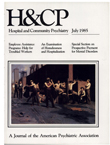Documenting the Relationship Between Homelessness and Psychiatric Hospitalization
Abstract
Homelessness among mental patients is frequently associated with deinstitutionalization. In a study to clarify the relationship between homelessness and psychiatric hospitalization, data from Illinois statistical reports and from admission reports of a state hospital that serves about 75 percent of the undomiciled mentally ill population in Chicago were analyzed. The rate of homelessness had increased substantially among psychiatric admissions over the last decade and was even higher among applicants for hospitalization. The homeless had lower admission rates than the domiciled, largely because of differing paths of referral. Nearly 20 percent of the homeless left the hospital against advice, and relatively few were referred to licensed long-term-care facilities. Until various systems develop adequate responses to the problem, both the numbers and the visibility of the homeless mentally ill are likely to increase.
Access content
To read the fulltext, please use one of the options below to sign in or purchase access.- Personal login
- Institutional Login
- Sign in via OpenAthens
- Register for access
-
Please login/register if you wish to pair your device and check access availability.
Not a subscriber?
PsychiatryOnline subscription options offer access to the DSM-5 library, books, journals, CME, and patient resources. This all-in-one virtual library provides psychiatrists and mental health professionals with key resources for diagnosis, treatment, research, and professional development.
Need more help? PsychiatryOnline Customer Service may be reached by emailing [email protected] or by calling 800-368-5777 (in the U.S.) or 703-907-7322 (outside the U.S.).



